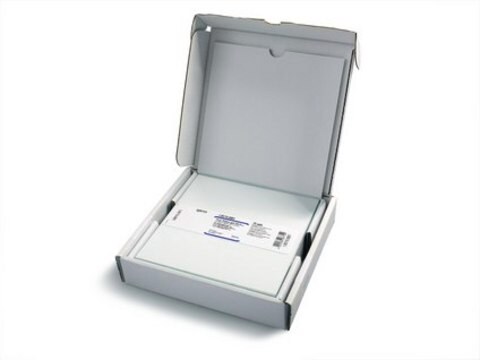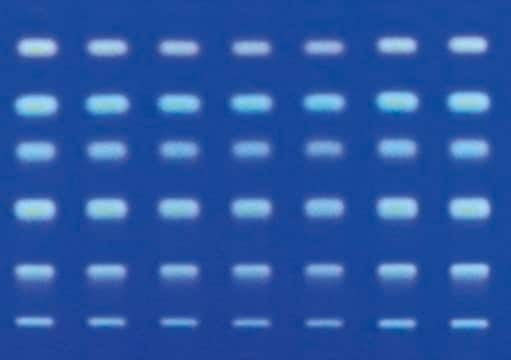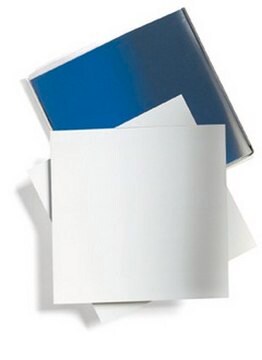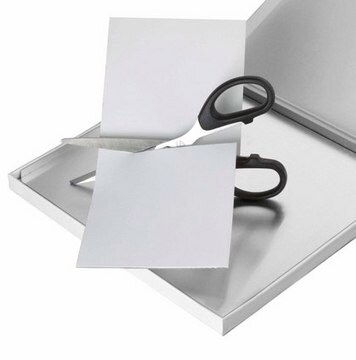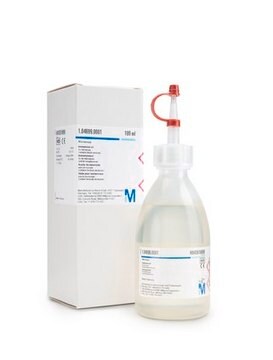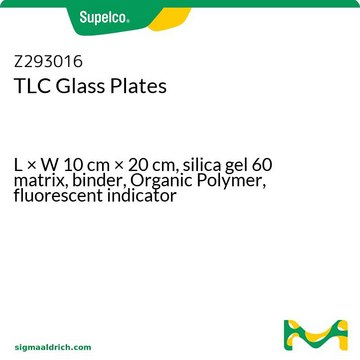1.05626
TLC plates, Silica gel 60
pkg of 50 plates, plate L × W 20 cm × 10 cm, glass support
Synonym(s):
Silica Gel 60 TLC Plates
Sign Into View Organizational & Contract Pricing
All Photos(1)
About This Item
UNSPSC Code:
41115711
NACRES:
NB.21
Recommended Products
material
glass support
silica gel 60 matrix
Quality Level
feature
binder Organic Polymer
fluorescent indicator: no
packaging
pkg of 50 plates
technique(s)
thin layer chromatography (TLC): suitable
layer thickness
250 μm
plate L × W
20 cm × 10 cm
particle size
10-12 μm
pore size
60 Å medium pore diameter
storage temp.
2-30°C
General description
50 Glass plates 10 x 20 cm
Our classical silica TLC plates are based on a combination of our proven silica gel 60 and the addition of a unique polymeric binder resulting in a very adherent and hard surface that will not crack or blister and even allow writing with a pensil on the surface without risk to damage the layer.
Application
- An eco-friendly and cost-effective HPTLC method for quantification of COVID-19 antiviral drug and co-administered medications in spiked human plasma.: This study by Ghozzy et al. (2024) presents a high-performance thin-layer chromatography (HPTLC) method using Silica gel 60 TLC plates. The method is used for quantifying antiviral drugs and co-administered medications in human plasma, emphasizing its eco-friendly and cost-effective nature (Ghozzy et al., 2024).
- Identification of variety-specific metabolites of basil by high performance thin layer chromatography-assisted metabolic profiling techniques.: Wulandari et al. (2023) used Silica gel 60 TLC plates in HPTLC to identify metabolites specific to different basil varieties, showcasing the technique′s capability in plant metabolomics (Wulandari et al., 2023).
- Separation and quantification of azelnidipine and chlorthalidone in a synthetic mixture using optimized HPTLC method.: Raimalani and Kotadiya (2024) developed an HPTLC method for separating and quantifying azelnidipine and chlorthalidone in a synthetic mixture, utilizing Silica gel 60 TLC plates for their analytical process (Raimalani and Kotadiya, 2024).
- Isolation, development and validation of HPTLC method for the estimation of β-carotene from Gymnosporia senegalensis (Lam.) Loes.: Jain et al. (2023) describe the isolation and validation of an HPTLC method for estimating β-carotene from Gymnosporia senegalensis, using Silica gel 60 TLC plates, highlighting its application in phytochemical analysis (Jain et al., 2023).
- Simultaneous Determination of Ceftazidime in Three Different Pharmaceutical Preparations Combined with Either Tazobactam, Tobramycin or Sulbactam by HPTLC-Spectrodensitometric Method.: Salem et al. (2023) applied Silica gel 60 TLC plates in their HPTLC-spectrodensitometric method to simultaneously determine ceftazidime in various pharmaceutical preparations, demonstrating its utility in pharmaceutical analysis (Salem et al., 2023).
Linkage
Replaces: 5626-6; 5626
Analysis Note
Specific surface area (according to BET; 5-Pt. measurement): 480 - 540 m²/g
Pore volume (N₂-isotherm): 0.74 - 0.84 ml/g
d 50 (laser diffraction, size distribution): 9.7 - 11.7 µm
Layer thickness: 210 - 270 µm
Deviation of layer thickness per plate: ≤ 35 µm
Chromatographic testing:
colour test
hRf-values
- bleu vif organol, colour test, lipophile:
11 - 25
- Ceres Black G, colour test, lipophile: 34 - 48
- ceres Violet brn, colour test, lipophile: 52 - 67
separation number (colourtest, lipophile): ≥ 10.5
Typical value determined on a conditioned plate
Eluent: toluene (45% rel. humidity)
Pore volume (N₂-isotherm): 0.74 - 0.84 ml/g
d 50 (laser diffraction, size distribution): 9.7 - 11.7 µm
Layer thickness: 210 - 270 µm
Deviation of layer thickness per plate: ≤ 35 µm
Chromatographic testing:
colour test
hRf-values
- bleu vif organol, colour test, lipophile:
11 - 25
- Ceres Black G, colour test, lipophile: 34 - 48
- ceres Violet brn, colour test, lipophile: 52 - 67
separation number (colourtest, lipophile): ≥ 10.5
Typical value determined on a conditioned plate
Eluent: toluene (45% rel. humidity)
Storage Class Code
10-13 - German Storage Class 10 to 13
Certificates of Analysis (COA)
Search for Certificates of Analysis (COA) by entering the products Lot/Batch Number. Lot and Batch Numbers can be found on a product’s label following the words ‘Lot’ or ‘Batch’.
Already Own This Product?
Find documentation for the products that you have recently purchased in the Document Library.
Customers Also Viewed
Our team of scientists has experience in all areas of research including Life Science, Material Science, Chemical Synthesis, Chromatography, Analytical and many others.
Contact Technical Service
